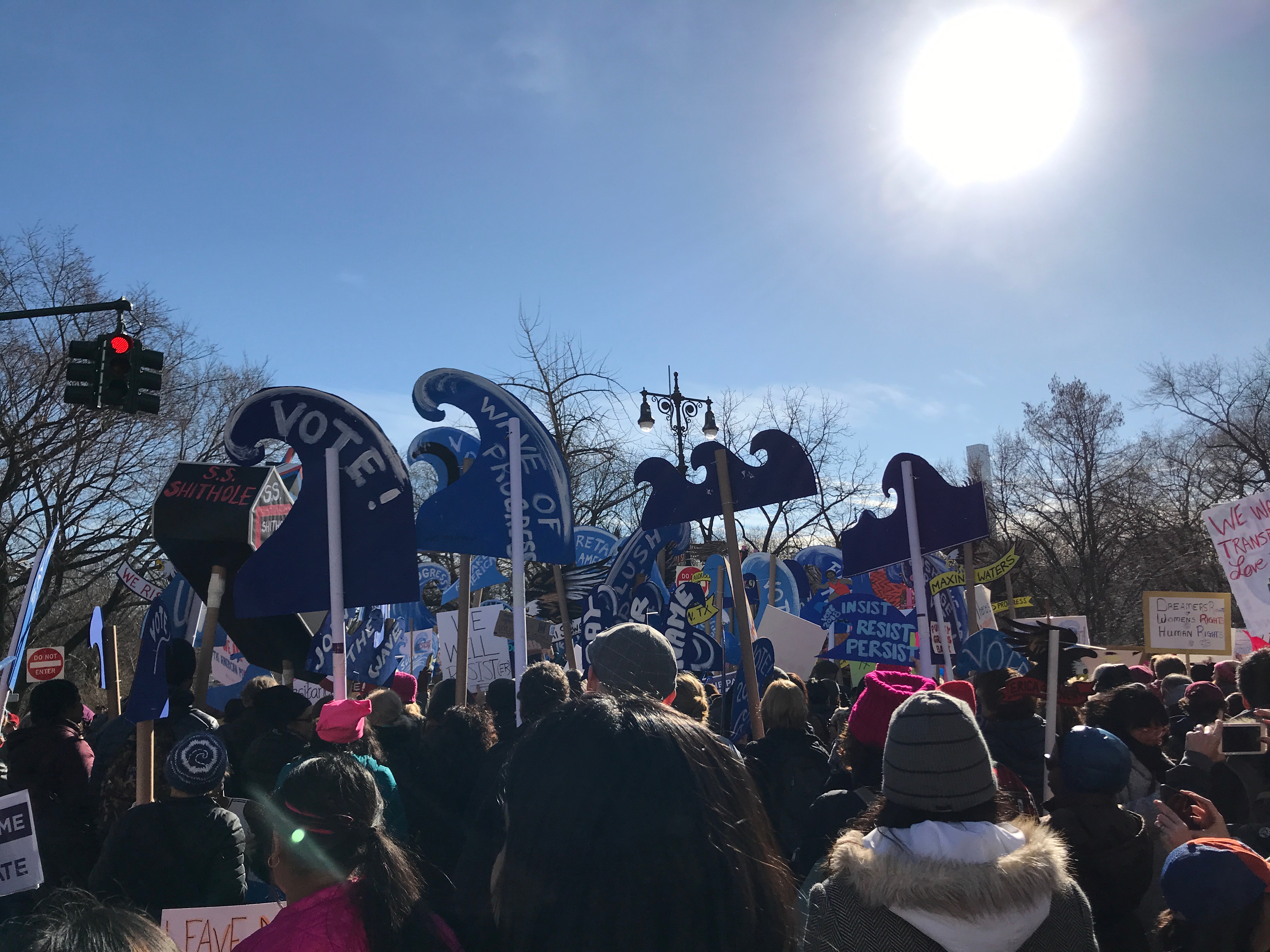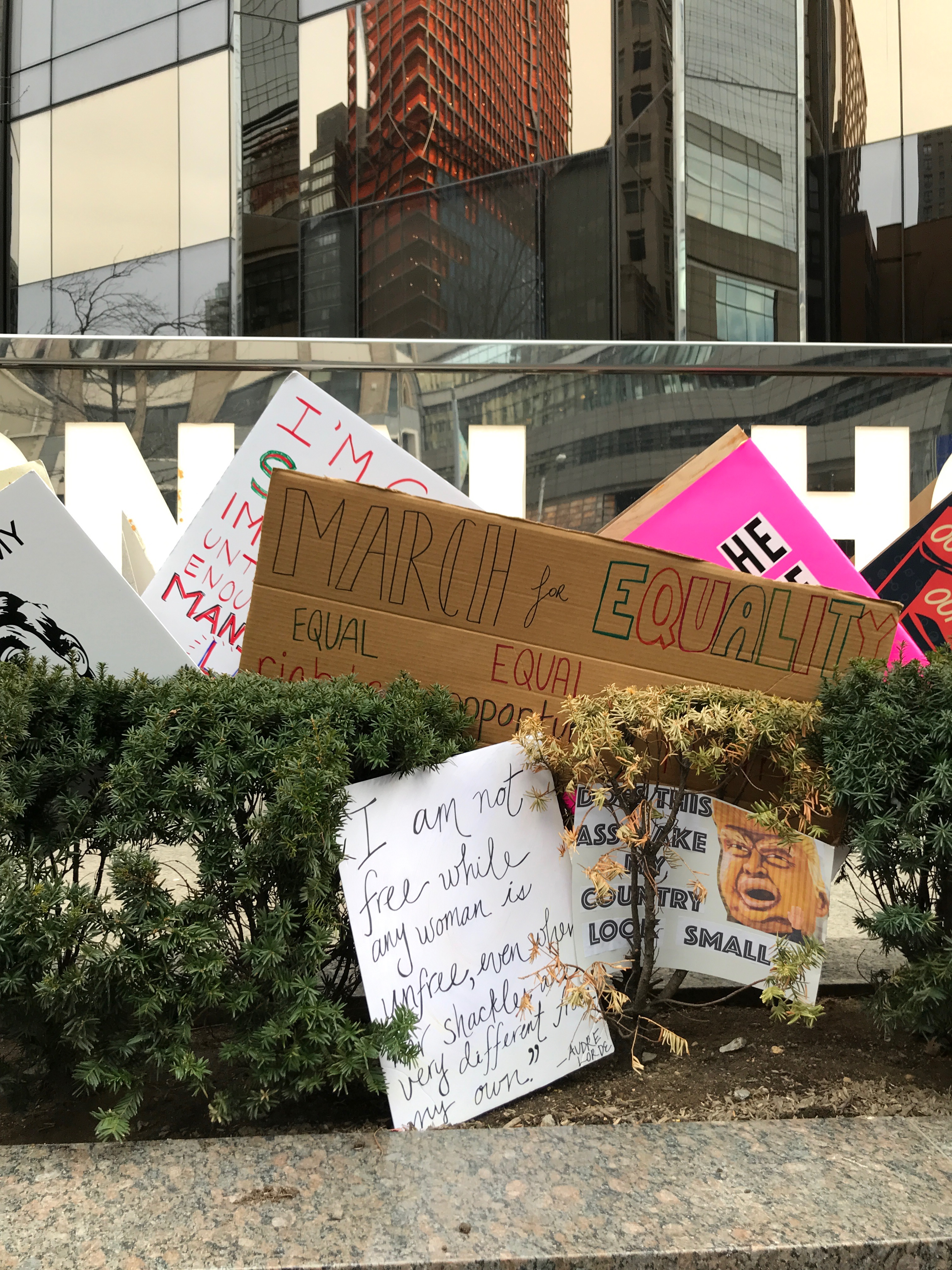A year after the inaugural Women’s March on Washington in 2017, at least 200,000 marchers spanned 40 blocks along Manhattan’s Central Park West and Sixth Avenue on Saturday.
The marchers moved toward midtown following a program at a stage set up near Columbus Circle—and yes, a Trump International Hotel. Speakers included Ashley Bennett—a Democrat who ran for office for the first time and unseated John Carman, the Republican former Atlantic City, NJ Freeholder after he mocked the Women’s March last year—and MILCK, a singer who wrote and performed a song called “Quiet,” with an acapella group of women at the Washington, D.C. march in 2017. The song—which many came to regard as the March’s anthem—was written about MILCK’s experience with domestic abuse and an eating disorder.
Videos by VICE
“The only way we’re going to make a change is if we commit to change.”
The New York City march—organized by the Women’s March Alliance—was one of hundreds of protests held on Saturday across the country to honor the anniversary of the first Women’s March. The commemorative events continued around the globe on Sunday, January 21. (The Women’s March Alliance is independent of the Women’s March organization, which held their own anniversary event in Las Vegas on January 21 called Power to the Polls.)
Many of the signs held on Saturday—“Grab ‘em by the midterms!”—and sentiments expressed focused on electoral support for progressive candidates.
“There was great energy today. Hopefully it will be reflected in the polls,” Thelma Mann, 66, of Chelsea, New York told VICE Impact.
Check out more videos from VICE:
“The only way we’re going to make a change is if we commit to change,” Actress Whoopi Goldberg, a surprise speaker at New York City’s march, declared. “We have to decide that the people who represent us have to represent all of us. They can’t represent some of us.”

For many, the march was all-encompassing of objectives beyond the ballot box.
“I don’t normally go to political things, but I love the energy here—this year and last year—and how big the tent of the Women’s March is, it’s for the whole spectrum,” remarked Dylan Jhirad, 50, Battery Park City, New York. “Regardless of your politics, you should be horrified of what’s going on right now. And everyone’s got their own thing they’re most passionate about that they’re out here for—and [the March] is big enough for that.”
Kaori Hino, 43, also of Battery Park City, agreed, praising what she said was “the inclusiveness of the march” and the diverse turnout of marchers.
“I’m fighting for equality for women. Total equality,” expressed Sara Cross, 26, of Gramercy Park, New York. Cross, who also marched in New York last year, continued, “I’m here to represent my generation and also see older generations out here—hopefully I won’t have to be 70 and still fighting for basic human rights. I want the older generation of activists to know that we are here because of their hard work and will continue to resist in pursuit of equality.”
“There was great energy today. Hopefully it will be reflected in the polls.”
Four women—three of them cousins, one a friend—belonging to the older generation Cross referenced stopped to speak with VICE Impact at Columbus Circle. “We all marched last year and are returning. We wouldn’t miss it—it’s a way to send a clear message,” said Lee Luce of Warwick, NY.
“We have to let those bastards know!” Ellen Miret of Nyack, NY chimed in.
“We have to let them know that it’s okay to be in the streets,” Deborah Stark of Mahwah, NJ added. “No, it’s mandatory!” Miret interjected. “That too,” Stark agreed. “Women are really powerful.”
Meg Smith of Chatham, NJ, commented on the march’s crowd control. “The New York City Police Department—New York’s finest—have done a really good job today.”
With the march occurring just hours after the federal government shutdown, many signs at the march expressed support for both the Deferred Action for Childhood Arrivals (DACA) program, as well as the Children’s Health Insurance Program (CHIP)—both of which have been at the center of the ongoing shutdown debate between Republicans, Democrats, and President Trump.

Solidarity was professed with Dreamers and members of the LGBTQ community.Others focused on the #MeToo movement—one man’s poster board read, “YES ALL MEN”—the gender pay gap, and reproductive rights. A pair of women dressed as handmaids from author Margaret Atwood’s the book and the popular TV series adaptation The Handmaid’s Tale, were in the mix.
Without shying away from the imperfections of the movement, many New Yorkers felt Saturday’s energy was one of solidarity.
Many pushed for intersectional feminism, evoking the words of feminist, author, and civil rights activist Audre Lorde, or more bluntly reminding the marchers—“53 % of white women voted for Trump” and “WHITE WOMEN: DO BETTER.”

Without shying away from the imperfections of the movement, many New Yorkers felt Saturday’s energy was one of solidarity.
“I like that the city of New York is coming together around the Unity Principles of the Women’s March,” Sasha Fountain, 25, of South Jamaica, Queens told VICE Impact. “People are standing to make a change, to not be compliant, and to stand with vulnerable populations. And they’re not taking the mic from the vulnerable, but letting them speak.”
More
From VICE
-

Peshkov/Getty Images -

Dave Chappelle (Photo by Richard Bord/Getty Images) -

Get this set for free, if you spend enough (Credit: LEGO) -

Screenshot: Steam
